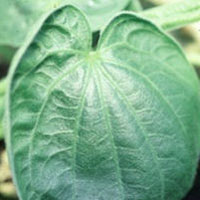Kava
 © Steven Foster
© Steven FosterSide Effects
In November 2001, German authorities announced that 24 cases of liver disease (including hepatitis, liver failure, and cirrhosis) associated with the use of kava had been reported in Germany; of these, one person died and three required a liver transplant.19
Prior to this report, it had been widely believed that kava did not cause any serious side effects. The 1998 edition of the German Commission E Monographs, considered to be an authoritative source on herbal medicines, does not mention liver disease in its discussion of kava’s side effects.20 Since that time, four case reports of kava-related liver toxicity have appeared in medical journals.21, 22, 23, 24 In two of these cases, severe liver failure resulted in the need for a liver transplant. Most, though not all, of the individuals who developed liver damage while taking kava were also taking at least one other medication that has been associated with liver injury.25 That raises the possibility that these other drugs, rather than kava, may have been responsible for the problem in some cases. It is also conceivable that kava interacts with some of these drugs, thereby increasing their toxicity. However, some of the cases of kava-related liver disease cannot be explained by the concomitant use of other drugs.
The possibility that kava can cause liver damage is supported by a survey of an Aboriginal community in Australia. Although occasional users of kava in this community generally had normal liver function, laboratory evidence of liver injury was quite common among heavy users of the herb.26 Furthermore, the risk of liver damage was directly related to the amount of kava consumed. It is not clear how relevant these findings are to other communities, since the overall health of the Aborigines who were studied was relatively poor.
More recent evidence suggests that liver injury resulting from kava extracts was due to the use of inappropriate kava varieties and plant parts. Evidence indicates that the peeled kava rhizome should be used, but in some instances the plant's aerial parts (which may contain a toxic compound) have been used. It is now believed that kava products are safe if they are water-based extracts derived from peeled rhizomes and roots of a noble cultivar such as Borogu, of at least five years of age, and taken in amounts not exceeding 250 mg of kavalactones per day.27 Despite this new information, it is strongly recommended that all individuals consult their physician before taking kava.
In recommended amounts, the most common side effect from kava use is mild gastrointestinal disturbances in some people. Kava may temporarily turn the skin yellow, according to some case studies.28 If this occurs, people should discontinue kava use. In rare cases, an allergic skin reaction, such as a rash, may occur.29 Enlargement of the pupils has also been reported after long-term use of kava.30 In the amounts discussed above, kava does not appear to be addictive.
Kava is not recommended for use by pregnant or breast-feeding women.
Copyright © 2026 TraceGains, Inc. All rights reserved.
Learn more about TraceGains, the company.
The information presented by TraceGains is for informational purposes only. It is based on scientific studies (human, animal, or in vitro), clinical experience, or traditional usage as cited in each article. The results reported may not necessarily occur in all individuals. Self-treatment is not recommended for life-threatening conditions that require medical treatment under a doctor's care. For many of the conditions discussed, treatment with prescription or over the counter medication is also available. Consult your doctor, practitioner, and/or pharmacist for any health problem and before using any supplements or before making any changes in prescribed medications. Information expires December 2026.













